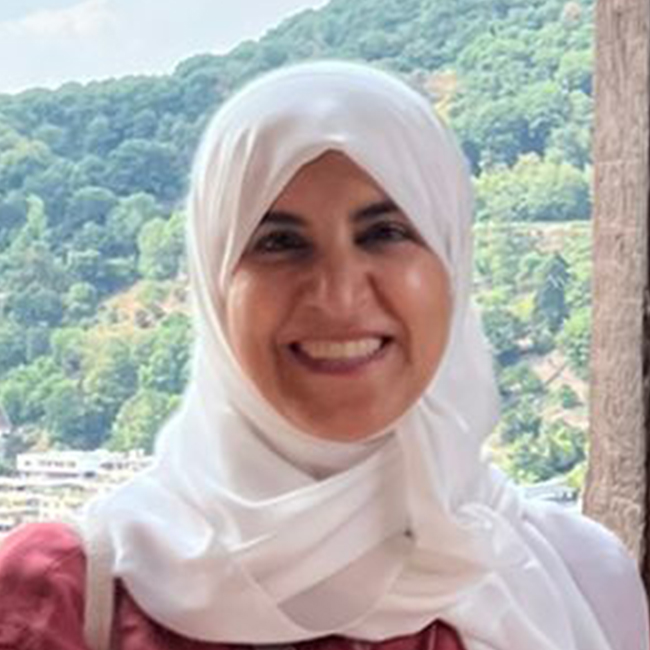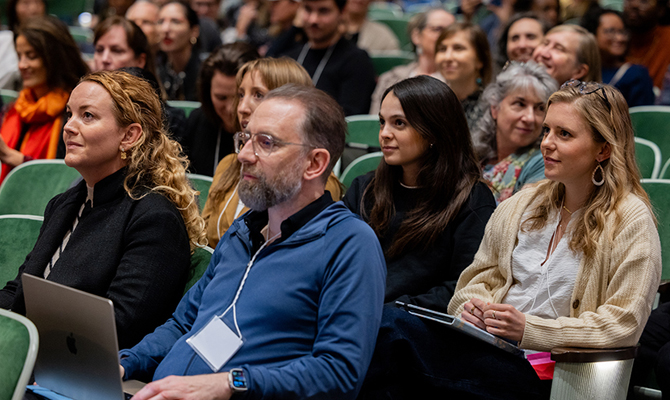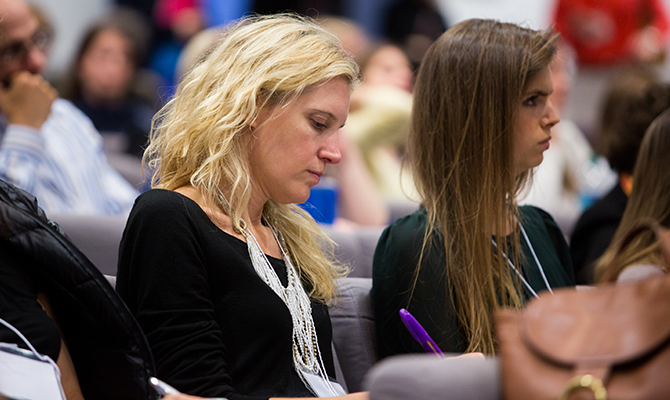
Managing Director, Al Muatheroon Professional & Management Development
Master of Applied Positive Psychology, University of Pennsylvania ’21
Master of Public Administration, University of Kansas ’12
Bachelor of Arts in English Language and Translation, Ajman University ’93
When Nadia Almheiri (Master of Applied Positive Psychology ’21) discovered positive psychology, she had already made a career change to focus on well-being: an experienced human resources professional and government employee of the United Arab Emirates, Nadia decided to establish her own business offering emotional and social intelligence workshops for government employees and private companies such as banks, as well as occasional public workshops. “There were so many things I wanted to do for my well-being. I wanted to learn things, do things, go places. I wanted to spend more time with my kids. I wanted to have some freedom with my working hours, and the ability to express my opinion freely,” she recalls. “So when I left my job, I thought, what do I love? I love working with people.” Nadia was already leading workshops for government agencies and private companies like banks when she enrolled in Penn’s Master of Applied Positive Psychology (MAPP); today she is a coach, a trainer, and now, “because I have this master’s degree, I can confidently say ‘well-being consultant,’” she adds.
To prepare for her career pivot, Nadia completed a certificate to become a certified trainer and coach through The Emotional Intelligence Network. Through this program she encountered positive psychology concepts such as explanatory style, a framework that explores how different people view positive and negative events. Reading up on these concepts led her to the Foundations of Positive Psychology specialization on Coursera. “Then I was hooked,” she laughs. When her family needed to move from Dubai to Washington DC while her husband completed a master’s degree for his work, Nadia decided the time was right for her to pursue an additional master’s degree of her own.
Nadia’s cohort in the MAPP program took place when the program was entirely virtual, with no scheduled onsite meetings, but “within the MAPP community, we were like family. We really connected.” The course assignments were rigorous, she recalls, particularly since English is her second language, but “I loved every minute. There was excitement and information sharing, but also connection.” She describes the progressive sessions as peeling an onion, and discovering things about herself and her cohort with each layer. On some days—especially during the winter—Nadia would turn off her camera and go for a walk during the breaks in online sessions. “I needed the sunlight, I needed the air,” she explains. “They said it was an excellent idea.”
For her capstone, Nadia focused on the connection between positive psychology concepts and the frameworks she learned during her certification in emotional intelligence. “For example, in emotional intelligence we talk about how to use the energy of emotions to help you reach your goals. I connected this to Barbara Frederickson’s research on emotions,” she says. “While negative emotions play an important role in our lives, they constrict our ability to think creatively and thus may hinder us from attaining our objectives. On the other hand, research shows that positive emotions help us think better, improve our ability to weigh pros and cons, and enhance creativity, all of which may help us achieve our goals.”
Nadia draws from both frameworks in the sessions she facilitates as a coach and well-being consultant. With Al Muatheroon Professional & Management Development—"Al Muatheroon means ‘influencers,’” she says—Nadia applies the science of positive psychology to help leaders see the importance of expressing appreciation to their employees, or to help employees make time for physical activity and social interactions in the workplace. A typical workshop will cover some basic concepts and definitions: for example, what is positive psychology, what does resilience mean, what are the five elements of the PERMA model? But learning is an active process in Nadia’s workshops, and clients should expect to get some hands-on practice. “We run, we jump, we talk, we role-play, and then people get comfortable expressing things on their mind,” says Nadia. If there is one thing she hopes her trainees take away, it is that “You cannot change other people. The only person you can change is yourself. Once you are at peace with this knowledge, you will accept others and try to improve yourself,” explains Nadia. “And through your communication, your smiling, your forgiveness, you are being a role model. It will reflect on others and you will see them smiling back.”
Since graduation, Nadia has continued to apply positive psychology principles to her relationships and personal well-being as well as her career; she is intentional about making time to meet with friends, to convey her needs to her loved ones, to go on daily walks. “The MAPP degree has impacted my life and work in establishing this organization and giving courses and lectures, but it’s also helped me build connections,” she says. She has gotten interested in aerial yoga, a practice combining traditional poses with silk suspended from the ceiling. “When you first look at that, you think, there’s no way I can hold myself upside down. But now when I do all the moves it’s not difficult, really,” she laughs. “Whatever you wish you to achieve, give it a try.”






